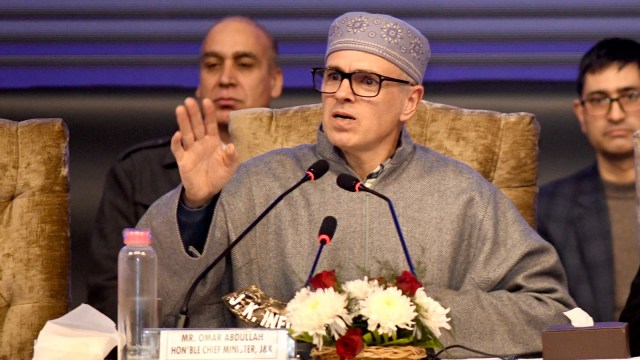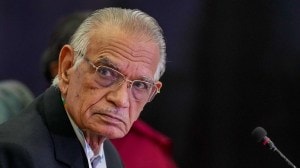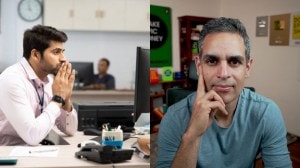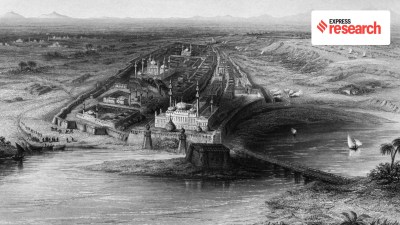PM Modi should be given ‘first opportunity’ to restore statehood instead of going to courts, says Omar
The CM was addressing a question about whether the elected govt should be going to courts to get statehood restored.
 Omar Abdullah said no meeting of the INDIA bloc is being convened. (File)
Omar Abdullah said no meeting of the INDIA bloc is being convened. (File)IN HIS first media interaction here Thursday, two-and-a-half months after taking over as Jammu and Kashmir Chief Minister, Omar Abdullah stressed on restoration of statehood to J&K but added that his government was willing to wait for the Centre to do so rather than taking recourse to courts.
While acknowledging that dual power centres were a problem in running the government, Omar also emphasised that he was under no pressure from the Centre, Raj Bhavan or the BJP to “change our thinking or our language or our agenda”.
“From the first day, the PM and the HM (Home Minister) have told me that ‘You have been given the mandate and we are in the Opposition. There will be no effort to destabilise this government. The support that we extended to the Lieutenant Governor will be extended to you. We will respect the mandate of the people of J&K’. These are the words of the PM and HM,” Omar said.
Pointing out that Prime Minister Narendra Modi had himself committed to restoration of statehood to J&K, Omar said he wanted to give the Centre “the first opportunity” to do so. “Every government or every individual has recourse to courts. But that was never going to be our first option,” he said.
The CM added that the Union government was not blind to the “benefits” of the elections that saw enthusiastic participation by the people of J&K. “The biggest promise the Central government made to J&K is restoration of statehood… When the Supreme Court gave its verdict… it said that statehood be restored ‘as soon as possible’. It has been a year and we believe that that’s enough.”
The biggest responsibility of his own government, Omar said, was to respect “the sentiments and aspirations” of the people of J&K.
On why the lack of statehood was his “biggest challenge”, he said: “J&K runs a deficit budget, therefore we are more dependent on the Government of India than other states and UTs.”
The dual power centres were also a challenge, Omar admitted. “It is one of the peculiarities of a UT that dual systems of power are built into the structure, which is why I said that this is a learning period for us… understanding where our authority begins and ends.”
While he played down “rifts” between his government and Lieutenant Governor Manoj Sinha, calling them “more a figment of imagination than reality” and “not widespread”, Omar added that the system needed clarity and that, for this, the Rules of Business laying out the demarcation of powers need to be specified at the earliest.
On the BJP’s claim that the abrogation of special status had resolved the Kashmir issue, Omar said: “For a minute if we assume that the issue of Jammu and Kashmir on this side (of the Line of Control) has been resolved forever, there is a part of Jammu-Kashmir on the other side as well… Does the BJP mean that the issue has been resolved for the part of Jammu-Kashmir that is across the LoC as well?”
Since that has not happened, the CM said: “The Kashmir issue still exists. We can debate about this part or that part, but the Kashmir issue has not been resolved. We too want it to be resolved.”
Apart from delayed statehood, the Omar government has also been facing protests over the expansion of reservations to other groups following the abrogation of Article 370, with NC MP Aga Mehdi Ruhullah joining the protesters. Taking on the criticism, the CM said: “I am of the belief that whether you are from the open or reserved category, today the fear is that our jobs aren’t just for us, our land isn’t just for us. We have to save these for ourselves first and then we can fight over reservations.”
Most parties in J&K have expressed the fear that with the modification of restrictions regarding “outsiders” following the scrapping of special status, the UT’s residents would end up losing the first right to jobs and land in J&K.
The NC vice-president was asked about ally Congress staying out of his government. Omar said: “The National Conference is part of the INDIA bloc, the Congress is supporting our government, and at the moment it is outside support. They have said that they will remain out until statehood is restored. I haven’t heard of any change after that.”







